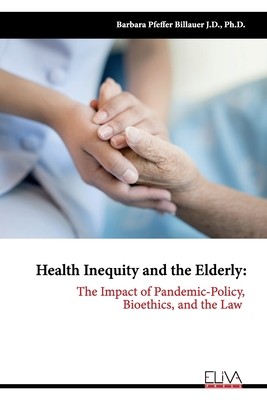
- We will send in 10–14 business days.
- Author: Barbara Pfeffer Billauer
- Publisher: Eliva Press
- ISBN-10: 9975154832
- ISBN-13: 9789975154833
- Format: 15.2 x 22.9 x 0.8 cm, softcover
- Language: English
- SAVE -10% with code: EXTRA
Reviews
Description
The race between CO-VID-19 vaccination and infection will continue until population immunity outstrips the virus' ability to mutate and infect. When the pandemic is over, investigators, political and scientific, will mull over what went wrong and what went right. Different responses will be compared to determine effectiveness, not just on lives saved, but on incomes lost. The economic fallout will become clearer. The unforeseen derivative impact of responses on human health will also emerge - at some future time.But maybe there are lessons to be learned right now: lessons relating to the evolution of thought and behavior during times of danger and uncertainty, lessons relating to evolution of responses, lessons relating to how policy is made, and identification of deficits arising when failing to consider significant, but perhaps not obvious, outcomes, such as effects on the elderly and on their mental health.The first part of the book contains early essays reflecting public confusion and terror; the second part reflects initial responses generated by the early panic. As the earliest essays indicate, initial focus centered on conspiracy theories rather than masking and social distancing, diverting and deflecting resources from more promising and productive responses.The third section analyzes recently emerging data. These data reflect another key - and erroneous theme of the early panic - based on early and stagnant research: the virus preyed especially on the elders. Ill-thought-out policy, manifesting in isolation directives, had additional and disastrous consequences on mental health, which, in turn resulted in significantly excess dementia-related deaths. These results cry out for consideration of epidemic responses from a legal "therapeutic jurisprudential" perspective, where concern for mental health ramifications is considered before policy implementation.The relatively new field of therapeutic jurisprudence traditionally involves considering mental health effects of legislation. As mental health consequences of CoVid 19 responses continue to proliferate, even, as I show in the final chapter, perhaps disproportionately affecting minority populations, involvement of the field becomes even more important.
EXTRA 10 % discount with code: EXTRA
The promotion ends in 20d.03:03:15
The discount code is valid when purchasing from 10 €. Discounts do not stack.
- Author: Barbara Pfeffer Billauer
- Publisher: Eliva Press
- ISBN-10: 9975154832
- ISBN-13: 9789975154833
- Format: 15.2 x 22.9 x 0.8 cm, softcover
- Language: English English
The race between CO-VID-19 vaccination and infection will continue until population immunity outstrips the virus' ability to mutate and infect. When the pandemic is over, investigators, political and scientific, will mull over what went wrong and what went right. Different responses will be compared to determine effectiveness, not just on lives saved, but on incomes lost. The economic fallout will become clearer. The unforeseen derivative impact of responses on human health will also emerge - at some future time.But maybe there are lessons to be learned right now: lessons relating to the evolution of thought and behavior during times of danger and uncertainty, lessons relating to evolution of responses, lessons relating to how policy is made, and identification of deficits arising when failing to consider significant, but perhaps not obvious, outcomes, such as effects on the elderly and on their mental health.The first part of the book contains early essays reflecting public confusion and terror; the second part reflects initial responses generated by the early panic. As the earliest essays indicate, initial focus centered on conspiracy theories rather than masking and social distancing, diverting and deflecting resources from more promising and productive responses.The third section analyzes recently emerging data. These data reflect another key - and erroneous theme of the early panic - based on early and stagnant research: the virus preyed especially on the elders. Ill-thought-out policy, manifesting in isolation directives, had additional and disastrous consequences on mental health, which, in turn resulted in significantly excess dementia-related deaths. These results cry out for consideration of epidemic responses from a legal "therapeutic jurisprudential" perspective, where concern for mental health ramifications is considered before policy implementation.The relatively new field of therapeutic jurisprudence traditionally involves considering mental health effects of legislation. As mental health consequences of CoVid 19 responses continue to proliferate, even, as I show in the final chapter, perhaps disproportionately affecting minority populations, involvement of the field becomes even more important.


Reviews